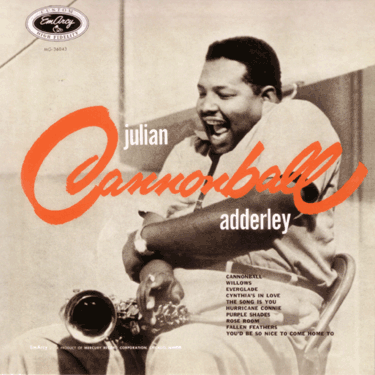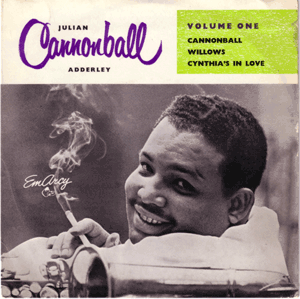|
| Discography |
| About Julian |
| About Site |
Since Dec,01,1998
©1998 By barybary

![]()
"JULIAN CANNONBALL ADDERLEY" |
 |
|
Original front cover LP EmArcy MG36043 |
CD Reissue
on 45 Rpm
 |
Willows /Cannonball
EP 6507/ ERE 1552 ![]()
You'd be so nice to come home/Rose Room/Everglade
EP 6508 / ERE 1555 ![]()
The song is you /Hurricane /Purple Shades /Fallen Feathers
EP 6509
![]()
Hurricane Connie / Cannonball / Cynthia's in love
EP 6144 ![]()
***********************************************
|
Recording date : Capitol Studio , New York , July 21, 1955. |
Julian "Cannonball" Adderley
alto sax , James
Cleveland trombone ,Nat Adderley trumpet
Jerome Richardson tenor sax , Cecil Payne baritone sax ,John Williams
piano
Paul Chambers bass , Kenny Clarke drums , Quincy Jones
arragements
THE SONG IS YOU
HURRICANE CONNIE
CYNTHIA'S IN LOVE
PURPLE SHADES
**********************************************
|
Recording date : Capitol Studio , New York , July 29, 1955. |
Julian "Cannonball" Adderley alto sax
,Nat Adderley trumpet Jerome Richardson tenor sax ,
Cecil Payne baritone sax ,John Williams piano Paul Chambers
bass , Kenny Clarke drums ,
CANNONBALL
EVERGLADE
YOU'D BE SO NICE TO COME HOME TO
***********************************************
|
Recording date : Capitol Studio , New York , August 5, 1955. |
Max Roach replaces Kenny Clarke, drums.
WILLOWS
ROSE ROOM
FALLEN FEATHERS
***********************************************
|
New stars are a dime a dozen in jazz nowadays. Every sixteen bars or so, somebody comes along who is hailed as the next this or the coming that, and in no more time than it takes to sign his name to a record contract, presto! he is the Star of his own LP. New stars of the caliber of Cannonball, however, are by no means a dime a dozen. This much was obvious almost from the moment he got off the train from Florida. Before we go any further it might be as well to explain that Cannonball's nickname has no bearing, except perhaps a coincidental one, on the dynamic manner in which he projects his musical thoughts through his alto saxophone. The name derived originally from "cannibal," an honorific title imposed on him by high school colleagues as a tribute to his vast eating capacity. (When you see Cannonball you will observe that his appetite clearly has not diminished). As far as his family is concerned Cannonball is Julian Adderley, born September 15, 1928 in Tampa, Florida. Studying music at high school and college in Tallahassee from 1940 to '48, he became proficient on trumpet, later on alto, clarinet, tenor and flute. Everybody in the Adderley family is musically inclined. Julian and his brother Nat, who plays trumpet on these sides, enjoyed a period of juvenile glory as boy sopranos. Their father, a jazz cornetist, and an old college roommate of his by the name of Kirksey who became a band director in Florida, were the major influences on the younger Adderleys. Julian himself became band director at Dillard High School in Fort Lauderdale in 1948. He has remained there almost continuously, with time out for a period in the service and for further studies of reed instruments at the U.S. Naval School of Music in Washington in 1952. As side ventures during his tenure at Dillard, he has had his own group off and on since 1948. While in the Army in 1952 to '53 he led both a large dance band and a small combo. In the summer of 1955 Cannonball came to New York. On the night after his arrival he and Nat visited the Café Bohemia in Greenwich Village, where Oscar Pettiford was leading a small group in which the tenor player was Jerome Richardson, whom you will hear on these sides with Cannonball. Richardson happened to show-up late that night, so Pettiford, who knew little about Cannonball and was not too anxious to take a chance, grudgingly allowed him to sit in. Pettiford whipped the band into I'll Remember April at a racehorse pace, fully expecting to chase an embarrassed Cannonball off the bandstand. Cannon-ball, of course, sailed through a long solo with an equanimity that astonished everybody. As you might expect, he remained on the stand as a welcome guest for the rest of the night. Within a few days word about Cannonball had spread around town. On the recommendation of Quincy Jones and Clark Terry, Bob Shad of EmArcy took the unprecedented step of signing Cannonball to an exclusive contract without ever having heard him play. The performances on these sides, for which Quincy wrote the arrangements, took place at three sessions held in New York City. At the first date, on July 21, 1955, the personnel included Cannonball on alto, his brother Nat Adderley on trumpet, Jerome Richardson on tenor, Cecil Payne on baritone, Jimmy Cleveland on trombone, John Williams on piano, Kenny Clarke on drums and Paul Chambers on bass. At this session the numbers recorded were The Song is You, Cynthia's in Love, Hurricane Connie, and an old pop song called Purple Shades. At the second date, held July 29, the same personnel was used except that J. J. Johnson replaced Cleveland. The tunes cut were Cannonball, written by Julian; Nat's Everglades; and You'd Be So Nice To Come Home To. On the third session, recorded August 5, a second personnel change was made: Max Roach replaced Clarke, J. J. was still on trombone and the rest of the men were the same. This date produced Willows, an old standard tune; Fallen Feathers, a Quincy Jones original inspired by a famous CharlieParker solo; and Rose Room. I believe that in the course of listening to these ten performances you will derive a clear picture of the magnitude and flexibility of Cannonball's talent. On a casual first hearing, particularly if you happen to listen to one of the faster tunes, you may get the impression that he sounds like Charlie Parker. Up to a point you would be right; but if you were to claim that a new ball player hit the way Jackie Robinson used to, or that a new speaker you heard at a banquet reminded you of the way F.D.R. spoke English, would any derogation, any implication of lack of originality be implied? Is there any better way of doing any job than the best way? Cannonball sounds like Parker only to the same extent that any two other artists in any other field might similarly be compared. Like F.D.R. and the speaker at the banquet, you could say that Parker and Cannonball both spoke the same language. Cannonball's favorite alto men are Charlie Parker and Benny Carter. That the peerless Benny made an impression on him that is still reflected in his work can be heard by close study of the several slow tempo numbers in this set. It would be hard to select any one item as a complete demonstration of Cannonball's talent, but my personal choice would be the number that bears his name as its title-on which, by the way, Nat also delivers what is probably his most impressive solo in the entire set. With occasional notable exceptions such as the late Fats Navarro, Florida has not made a large contribution to jazz history. This gap in our culture may be said to have been filled substantially by the arrival of Cannonball; and after hearing these sides there can't be much doubt in anybody's mind that he has indeed arrived. I wonder whether those young students at Dillard High know just how lucky they are. Liner Notes by Leonard Feather.
|

